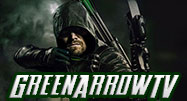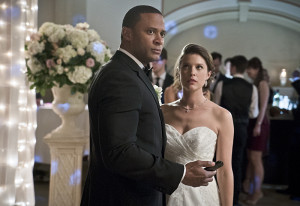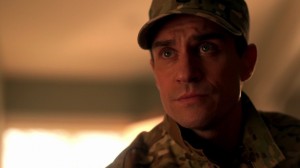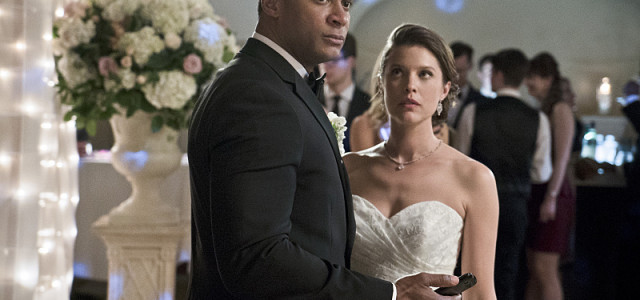
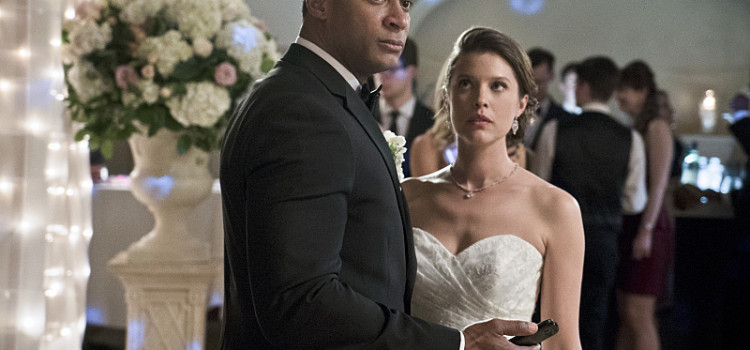
Arrow #3.17: “Suicidal Tendencies” Recap & Review
Recaps & Reviews March 30, 2015 Matt Tucker

SUMMARY: A capable and mostly poignant exploration of whether a soldier or crimefighter can do their job and still have love and family in their life.
If you have not seen this episode yet and do not wish to be spoiled, do not continue reading!
Recap
Diggle and Lyla’s wedding day has finally arrived, and Oliver is late for wedding party pictures. The officiant is also MIA, so Ray Palmer, Felicity’s date, offers his services as a minister. The two are married and everyone enjoys the reception. As John and Lyla enjoy a dance, all of Team Arrow receive news alerts on their smartphones about a news story reporting that the Arrow has begun killing again.
The mayor holds a press conference with Ray, who announces he will use his extensive resources to help the police bring the Arrow to justice. Everyone realizes that this is the work of Ra’s al Ghul and the League of Assassins to discredit Oliver. He gets the team out into the field to track down League members posing as the Arrow. Before John can join, Oliver insists he and Lyla go on their honeymoon. Leaving for the airport, the couple finds Floyd Lawton in their limo with an assignment for the Suicide Squad.
Amanda Waller briefs Task Force X on an event in the country of Kasnia where a U.S. senator and hospital workers have been taken hostage by terrorists. Lyla is prepared to go alone but Diggle insists he goes with her. They wonder if it will just be the three of them but Waller introduces her newest operative, Carrie Cutter, the crazed Arrow stalker known as Cupid.
One of the League faux-Arrows attacks and kills a number of criminals in a warehouse before Oliver intervenes. He’s confronted by a handful of League Arrows and manages to take them all down. Maseo arrives to insist that Oliver accept Ra’s command that he take over, but Oliver refuses again. The assassins escape, while outside Ray arrives on-scene in the A.T.O.M. suit and locates the Arrow standing amidst the bodies of the criminals. He runs a scan of the vigilante’s face and discovers that it’s Oliver Queen.
Later, Ray presents his evidence to Felicity who unsuccessfully tries to play dumb. Ray feels betrayed and tells her he’s going to take his evidence to the police. He’s intercepted by Laurel, and she attempts to dismiss his evidence and let him know that Oliver can sue for defamation if he tries to go public with it. Ray realizes that she’s in league with Oliver and likely the Black Canary. He decides to take matters into his own hands.
In Kasnia, Lawton tells Diggle and Lyla that their marriage can’t work if they’re sprinting off to places unknown on missions with the squad. They refuse to accept it. The squad infiltrates the building and takes out the terrorists to free everyone. Suddenly, Senator Cray turns on them. The squad makes an escape from the room, with Lawton taking a bullet and Cutter’s affections. Trying to call out to Waller, Cray intercepts their signal and explains what’s going on.
The terrorists are actually hired mercenaries, and Cray was the mastermind behind the whole thing in an attempt to have a legacy story to sell the public during his run for president. He now has to deal with the hostages as witnesses who can’t survive. Reinforcement mercenaries arrive as the squad looks for a way out. Lyla discovers that Cray has rigged the building to explode, intending to kill everyone while he escapes to tell his story to the world. She asks John what they were thinking in accepting this mission. Lawton assures them they will get back to their daughter.
Felicity reveals to Oliver and Roy that Ray has a super suit and knows Oliver’s secret. He’s angered that Felicity never mentioned this before and that she helped him with the suit. He goes to speak to Ray to get him to back off, particularly because he doesn’t understand what’s going on. Felicity discovers news of an attack at the power plant and the Arrow and Arsenal go to the site. They find that Ray set up a ruse to draw them there, and he attacks to take them both down. Oliver disables the power of the suit and confronts Ray. He insists that he’s no longer a killer and demonstrates it by not harming Ray. He also tells Ray that Felicity chose him over Oliver and that he should trust her. Ray takes it to heart.
The Squad devises a plan where they break into the room with the hostages with Lawton running cover as a sniper. They are successful and Lawton shoots the trigger out of Cray’s hand, setting off a deadman’s switch. As they escape with the hostages, Lawton reveals that he’s staying behind to offer cover as more mercs are on their way. He considers it a present to help Diggle and Lyla get back to baby Sara. They get free and turn to see Lawton on the roof as the building explodes.
Back home, Lawton is blamed for the hostage situation in Kasnia. Cray survived and has paid all of the hostages off to keep quiet. Diggle tells Lyla he’s going to quit Team Arrow for the sake of their family. She assures him that the work he and Oliver are doing for the city is good and worthy of the pride of their daughter. After Waller blocked her attempt to expose the truth about Cray, Lyla states that she’s quit A.R.G.U.S. because she wants Sara to be proud of what she does.
Ray and Felicity talk and she offers to be his partner. He happily accepts and tells her he trusts her. They go to the mayor’s office to tell her they believe an impostor is trying to set up the Arrow as a killer. Lance refuses to hear it. Suddenly, an arrow breaks through the window and impales the mayor in the heart. On a rooftop across from city hall, Maseo is in full Arrow disguise. He trains an arrow on Felicity through the window and then lets it fly.
FLASHBACKS
Floyd Lawton returns from war in Afghanistan to the happy surprise of his wife. He meets his daughter for the first time, but she’s leery of him. Lawton suffers from PTSD, feeling guilt for the number of lives he’s taken as a sniper. His wife and daughter become scared at his anger and call the police when he pulls a gun on her. She gets a restraining order and Lawton is arrested. In jail, he’s made an offer by a mysterious woman to put his skills to use for a collective that refers to themselves as hive-like. His first assignment: kill Andrew Diggle.
Review
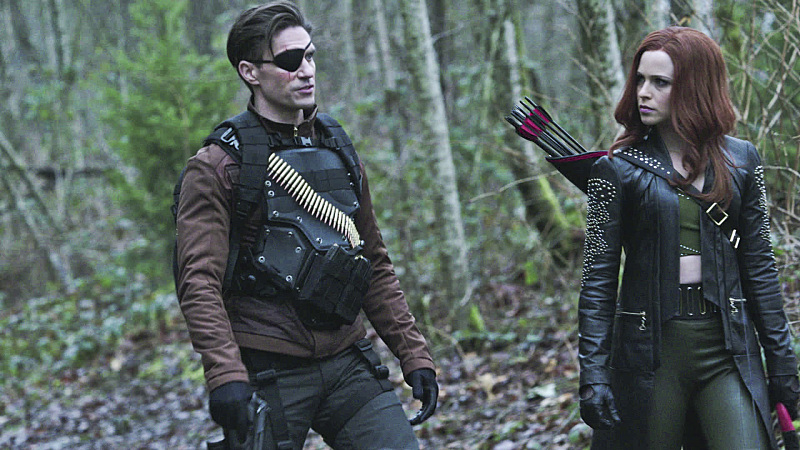
The curious case of Floyd Lawton.
Color me surprised to get a flashback to Lawton’s earlier life, to the pivotal moments that led him down the path to the mercenary assassin we’d all come to know as Deadshot. Thoroughly unforeseen but welcome, these dalliances into his past not only touched upon the au courant issue of PTSD in our returning soldiers’ lives but also served as a strong bridge for the the overarching theme of the episode. Paired with the love-deranged Cupid for the present mission seems born of necessity to fill the team, yet it proves to be a striking contrast that also aids the subject matter quite well.
Even as disparate as the Suicide Squad’s mission to Kasnia seemed from the tugs of war between Oliver and the League and Oliver and Ray Palmer, all of it was thematically related to the fundamental human conundrum of relationships. In particular, love in the time of war and harm.
Deadshot is one of the more enigmatic anti-heroes/villains of the DCU, most commonly associated with the Batman side of building. When introduced very early in Season 1, there was some trepidation that the series might start relying a bit too much on the Batman oeuvre and perhaps not so well. In fact, Lawton leaves the hour seemingly killed, much to the chagrin of many in the nascent audience at the time.
Yet, his standing as a well-established character in the comics apart, this seemed less a miscalculated waste than it did the origin of a character who would play a far more valuable part in the overall story of the series. Lo and behold, it wasn’t long before he was brought back, now with his missing eye replaced by the trademark bionic sight. The caustic rogue took on a special significance as the man who killed John Diggle’s brother and became a fan fave in the process. Such a fave that he’s given the rare honor to be a primary focus of the flashbacks.
When Deadshot was introduced to live-action as a duster-wearing cowboy riff in the series Smallville, he seemed destined to be a victim of style over substance, a cool looking terminator you were never supposed to give much of a second thought. It has been welcome and surprising to see the shades they’ve been able to give to Lawton on this series to make him more three-dimensional, especially in light of the fact that he’s the guy who actually pulled the trigger on Dig’s brother. This is a guy we should hate, by all rights, and yet he’s sympathetic. Getting to see his family and what the horror of his tremendous skill has brought upon them offers a lot of poignancy, and it’s unpredictably a story I’m not sure we knew we needed to know. We’re the better for it.
To see Lawton meet his daughter Zoey for the first time, given the context from last season’s “Suicide Squad,” was quite stirring. The reactions they got from the young child actress went above and beyond to really lend an authenticity to the storyline. Given the spotlight placed on the life-altering and long-lasting effects of war on our soldiers nowadays, the story itself was familiar. That said, it was capably told with the emotional impact that a flashback should provide to help inform us more about this person we’ve come to know.
If there is but one criticism to the Lawton story, it’s that, as much as I enjoy Michael Rowe in the part, there was a hair’s breadth of nuance somewhat missing from the sequence where he snaps on his daughter and wife. It played better on a second viewing, but the whole thing felt played at a consistent high elevation. This could actually be much truer to life, and it’s certainly worth giving them the respect for broaching the subject, but it seemed as if it would’ve benefited from a few more levels, even if slight. Just to show the escalation of his irritation, the spike of his anger, the sense of a total loss of conscious control in the moment. It might be a nitpick for most, but it’s essentially flavoring to taste.
Perhaps the most intriguing aspect in all of this is that the flashback finally picks up on the long-dormant H.I.V.E. thread. Diggle’s been decidedly distracted from the revelations that some clandestine organization was behind Lawton’s assassination of Andy, what with Slade Wilson’s campaign against Oliver and the city, being at odds with Amanda Waller, welcoming a new baby into the world, prepping for a wedding, Oliver’s believed death and reappearance, and the threat of Ra’s al Ghul. The question reiterated is why. Just what was Andrew Diggle into that represented a threat to H.I.V.E. worth taking out. We got our first brief glimpse at the man earlier in “The Return,” and he was working private security. As his chosen line of work, did some assignment with a firm run him afoul of these people? Though the flashback was Lawton-focused and connected some dots for him, it was quite open-ended on that mystery.
With but six episodes left on the season and where the story is headed, one is left to wonder if we’ll get any more on the Diggle mystery this year, or if the breadcrumbs but continue. It’s safe to say that isn’t the last we’ll see of Floyd Lawton, as we’re sure to pick up on the actual mission to kill Andy at some point in the future. If I were a betting man, I’d be tempted to lay coin on the possibility that Lawton’s seeming sacrifice in the present is likely not what it seemed either. There was an admirable quality to it all, made all the more touching by Lawton’s personal reasons for wanting to see Diggle and Lyla survive the Kasnia ordeal. It also seemed like a far too convenient way for Lawton to fake his death and escape A.R.G.U.S.
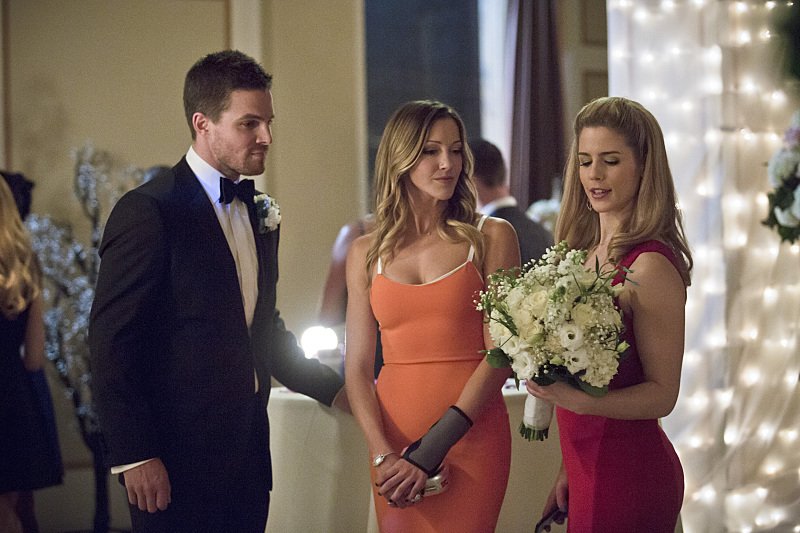
The frequently trotted out trope of a hero trying to balance — or sacrifice — engaging in a romantic relationship with their chosen duties has put in a number of appearances this season. It’s become a main pillar of Oliver’s existential struggle. As much as a vocal minority chide the soap opera antics, they are commonly included in comic stories, live-action and print, because they add human dynamic. It’s a far different feel from a parental or sibling relationship because it’s far more intimate and directly personal.
The hour pushes the theme for all in relatable, if not consequently very interesting, ways. The best of these is between Diggle and Lyla, rightfully so given their second wedding to open the episode. What’s really great to enjoy is that their’s is a true partnership. There are still moments that it’s kind of odd how Lyla knows the truth of what her husband and Oliver Queen do, knows the identities of all on Team Arrow and their associates. Yet, there’s something inherently cool and comforting in the fact that John Diggle goes home from the “office” at night and can tell his now wife about his day without holding back. Even more, that she works in a field where she’s completely understanding of what they are doing. This makes each one’s concern over their family’s well-being palpable and pressing. It’s nice to see a couple on any series that works together toward making their lives work. Though, David Ramsey’s saddled with having to say the name Lyla far too many times in the scene where they both talk about walking away from their, for lack of a better term, professional lives, overall it’s quite a touching moment. Consider this one audience member who is very grateful to have this kind of healthy relationship around.
That is particularly in counterpoint to the other pairings the show currently offers. The ever-present spectre of the Oliver-Felicity relationship continues to prove toxic for both characters, bringing out their worst tendencies and often grinding the show to a slow crawl if not a stop. There’s a lovely chemistry that still exists between them that proves this a vital connection for both as people, but any attention spent on this being romantic sends everyone into a tailspin. Oliver has become positively obsessive about his feelings for his lovely friend and masochistic in his way of dealing with them. Yes, it’s human to linger and regret choices you make for idealistic reasons that run contrary to what you want in life. It’s patently unfair to continue to passive-aggressively sour the air in the room with Felicity because she’s relatively moved on.
Therein lies the other end of the issue with this constant tug-of-war. Felicity’s feelings are obviously a gaping wound for her. Whether there is some truth to it or not, she will frequently see any criticism or move on Oliver’s part for her benefit as some sort of way to block her from happiness. Part of this is rooted in a deep-seated feeling that she wants him to just man up and fight for her. She might try to convince herself otherwise, but her actions and reactions to any idealistically positive thing Oliver does — such as finding himself and renouncing the offer to become Ra’s al Ghul — speak volumes. This does nothing well for Oliver because he keeps receiving mixed signals, even if he persuades himself to not act on them. Relationships can be messy in their humanity, which is fine and can be a gratifying palette to work with on a show. When it continuously harms characters and the audience’s enjoyment of those characters, better choices need to be made.
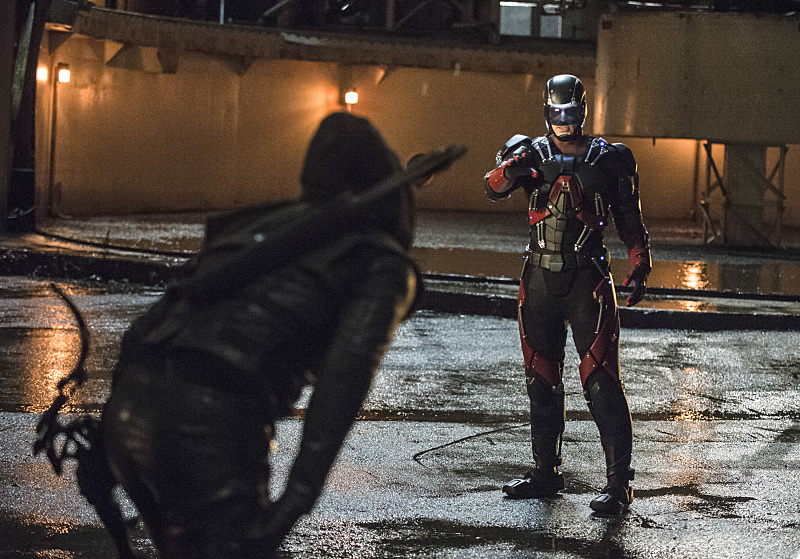
That was something that made Felicity’s interaction with Ray Palmer so positive. It existed outside of that murkiness … until now. Setting up a love triangle confrontation was all but inevitable. Gratefully, it wasn’t dragged beyond this episode. It’s always unfortunate in superhero adaptations when the source of a hero’s battle with a villain or with another hero is boiled down to a petty conflict over a romantic partner. Thankfully, they give Ray some philosophical reasoning for wanting to take down the Arrow, even if it was already covered ground. In addition, he had some understandable feelings of betrayal in discovering that Felicity was aiding what he believed to be the murderous Arrow. Still, it was hard to escape that feeling that this was all over a girl, especially as Oliver’s resolution is to tell Ray that Felicity chose him.
What was probably most frustrating about this situation is that both Felicity and Oliver had ample opportunity to truly clear the air with Ray. This was a situation where you have the full conversation. You tell Ray about the League and their attempt to coerce Oliver into working with them by smearing the Arrow’s reputation. The lid is already off. Be bold and contain it. Instead, both dance around the truth and allow things to escalate to the power plant showdown. I’m sure Roy Harper isn’t so appreciative that they didn’t bother to consider telling him the most relevant details of what’s going on. This probably could’ve avoided the mayor and Felicity both being tagged by Maseo’s arrows, as well. Arrow is often very good about not using artificial roadblocks, but here’s a case where they chose to deny natural conversation in the course of creating drama.
That all said, it’s interesting that they set up very clear parallels between Ray and Oliver all season, culminating in this choice of having a lover and partner while wanting to devote oneself to protecting the city. There is some truth to Oliver’s assertion that Ray is to new to this game to be able to properly make the choice like he has. Yet, this is also a very Oliver kind of response to the situation. In that, it’s nice to see the contrast with Ray choosing to have both. He might eventually find out that he can’t, but he at least welcomes the opportunity to try.
‘Suicidal Tendencies’ is one of those very theme-heavy episodes we get from the series every now and then. From that perspective, it’s actually one of the best to serve its theme, as all of the storylines, including the flashbacks, all relate to that theme. As an episode, it’s a capable one that makes great use of Floyd Lawton’s story past and present, as well as the great connection between John Diggle and Lyla Michaels. Yet, choosing to artificially create drama by refusing to have characters actually do their best to diffuse a troublesome situation, drags on everything overall. But hey, we got a fun little Arrow vs. Atom moment out of it.
Odds & Ends
- “The Arrow.” (beat) “Supersuit.” “Actually, I prefer the Atom.”
- Never missing a chance to radio-check the source material, the emergency frequency Lyla tries to call out on in Kasnia is “Delta Charlie,” or DC.
- Oliver’s reaction to his arrow bouncing off of the A.T.O.M. suit is priceless.
- As is Roy’s reaction to hearing that Ray built a “supersuit.”
- Laurel references “An Innocent Man” and “Damaged” when talking about Oliver having been cleared of suspicion about being the Arrow previously. Ray correctly guesses that Oliver intentionally allowed himself to be captured and cleared of being the Arrow to case doubt on any such thoughts in the future.
- Did Oliver just leave the incapacitated Roy behind at the power plant after Ray’s attack? Sure seemed like it.
- The friend of Lyla’s that was supposed to officiate their wedding is named Rick. Could be a reference to Rick Flag, who is frequently a member of the Suicide Squad in the comics. Flag also led the first version of the Squad to appear in live-action during Season 10 of Smallville, played by Ted Whittall. Flag is also one of the characters set to appear in Warner Bros. upcoming Suicide Squad feature film. Joel Kinnaman of The Killing and RoboCop is set in the part.
Matt Tucker Editor/Senior Writer/Reviewer
Matt Tucker is a stage and film actor, writer, Seattleite, comics nerd, sports fan, and aspiring person. Someday, he’ll be a real boy. He's an editor and senior writer for KSiteTV network (GreenArrowTV, DaredevilTV) and the sports blogs Sonics Rising and Cascadia Sports Network. Follow him on Twitter at @MattBCTucker or @TuckerOnSports
Arrow Reunion: Calamity Jane Now Available on Tubi
News Jun 17, 2024
Bid on a Piece of Arrow (and Flash) History!
News May 22, 2024
Arrow Season 8 Blu-ray & DVD Coming April 28
News Feb 5, 2020
End of an Arrow: Thoughts on the Series & Finale
News Jan 28, 2020
